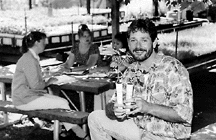Dreams, Inc.
By Bruce Robinson
A BIG PART of it is supplying these guys with dreams," says Wes Winter, his eyes gleaming with enthusiasm as he describes the work of Circuit Rider Productions, the Windsor-based non-profit agency that he heads. "They've never been out of their niche in the community, never been to Rohnert Park, let alone San Francisco," he continues. "So our goal is to help them learn how to envision the future."
As a practical matter, the Circuit Rider programs take a number of forms, most involving some kind of job training or temporary employment and virtually all with an element of environmental consciousness. The merging of those two threads has been central to the organization since its founding, Winter says, as the agency prepares to celebrate its 20th anniversary later this month.
"Our programs have diverged over the years," he explains. "We have a clear human services division and a clear environmental restoration division. But we always have programs that overlap the two and flow back and forth and have kids building trails, working on park maintenance, that sort of thing. There's a philosophy that runs through the organization that really tries to connect people with their environment in whatever ways we can."
Circuit Rider has a broad definition of the environment as, not just nature, but social-urban surroundings, too. "Getting the kids outdoors and connected," Winter adds, "builds environmental awareness and gets them involved in their community in a way they hadn't thought of before. It gets them involved with the people who live next door and with how they're taking care of the local park or the Laguna de Santa Rosa or an open space near Cloverdale."
Most of the young students--more than 1,200 over the past 20 years--have been involved with the Youth Conservation Corps, a summer job program that teaches landscaping skills. Other programs include classes in Geological Information Mapping, which employs computer-assisted design; training in water-testing methods; and gang-intervention efforts that are addressed to middle-school students. "The kids in that program are 11 to 14--little guys," Winter says. "They're [gang] wannabes at this point, but that's when we want to get ahold of them."
ON THE ENVIRONMENTAL SIDE, Circuit Rider operates a thriving native plant nursery that is put to direct use in the numerous revegetation projects for which they contract, using trained workers rather than students.
Clients include state agencies and such major businesses as PG&E, but all jobs need to pass a four-point checklist: They must benefit the community; result in self-sustaining ecosystems, use site-specific native plant species, and "provide opportunities to pioneer new technologies in ecological restoration," an agency brochure notes.
"If it doesn't fit the criteria, we don't do the contract," Winter adds simply.
Those projects account for only a part of the agency's $1.1 million annual budget, with a complex and shifting mix of grants, private donations, and contracts, with the state or local school districts making up the balance. "We have to treat this like a small business, rather than a non-profit," Winter says as he tries to explain Circuit Rider's evolution. "It's tough, depending on what's going on politically, because there are all these shifts that can have impacts on the agency. But we're still here."
With that endurance comes a history of positive impacts in the community. "There are a lot of kids around Windsor who we've known for years that went through a middle-school program and are now bagging groceries over at Raley's or Safeway. That's not unusual at all. We see kids that aren't going down the wrong path, that seem to be college-bound or looking towards employment," Winter says. "We do see successes."
He pauses, then grins and leans forward to share an example. "There was one old lady in her 80s who literally had not been able to get out her front door in five years because the shrubbery had grown over it and she was too frail to cut it back. She was coming and going from the back door. There are cracked sidewalks, there's debris," he recalls. "When we first went to her and said, 'Can we clean this up for you?,' she was afraid to have kids around there. All she'd read in the newspaper about kids was negative stuff, that they're all trouble. She thought that they'd be staking her out to come back at night or on the weekend when there wasn't a crew supervisor there. It took a lot of gentle prodding to get her to allow us to come in.
"Within a week, those kids were calling this old lady Grandma and she'd bake them cookies. Now they all live in her neighborhood, they walk by, say 'Good morning, do you need anything, can I do something for you after school?' It's creating those kinds of connections that we're really looking for."
When it works, everybody wins. "From the senior's perspective, she got the work done. From the kids' perspective, they got paid. From the city's perspective, the city got improved, and from ours, we got to do some community building. That's the underlying theme in all of our human service and our environmental work," Winter smiles.
"It's all about building communities, and a more sustainable future for everyone."
This page was designed and created by the Boulevards team.
Windsor-based program helps at-risk youth meet environmental responsibility

From the June 13-19, 1996 issue of the Sonoma Independent
Copyright © 1996 Metro Publishing and Virtual Valley, Inc.
